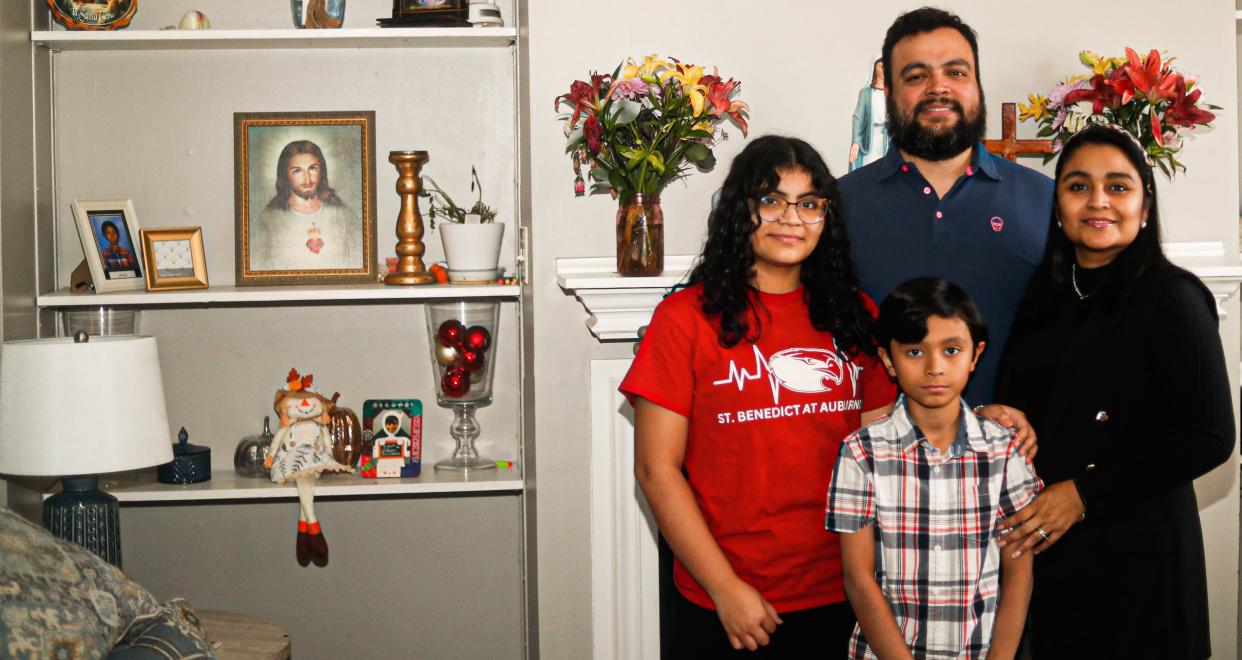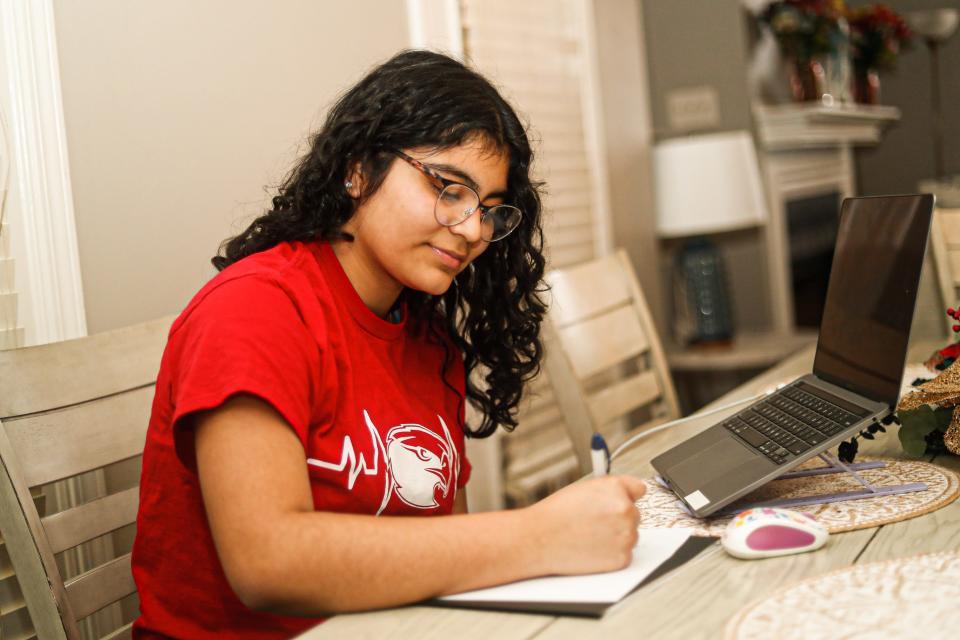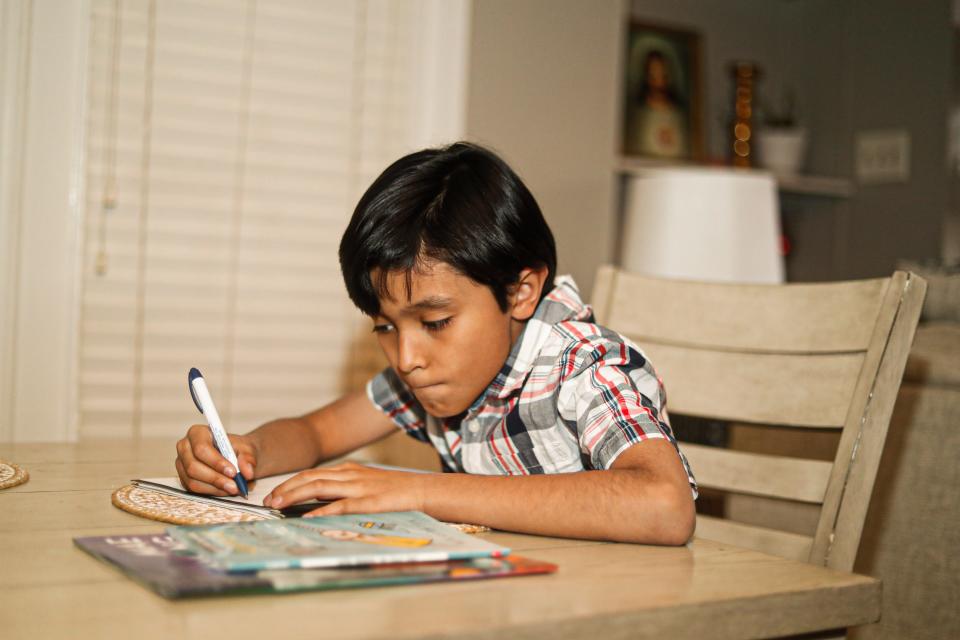'Weight on the balance:' What a Memphis family using Tennessee vouchers thinks

In Honduras, Christian Rivera and his family were comfortable. He owned a reasonably successful restaurant, and they lived in a nice house. He and his wife, Siria López, could afford to send their children to a private Catholic school and take them on annual vacations in the United States.
But roughly five years ago, gang violence in Honduras forced them to leave their home and flee to America. They landed in Memphis, and the transition wasn’t easy. Today, their lives are considerably different.
The family budget is tighter, at least for now. Rivera is no longer a restaurant owner; he’s a licensed contractor working long, hard hours in the construction industry. They’re seeking U.S. citizenship, but obtaining it is difficult. And they miss Honduras ― a place they can’t return to without facing grave danger.
“My country is my country,” Rivera said. “It’s your roots. … My whole body wants to go back.”
But he and his family are also happy in the U.S., where they’re accustomed to life. Rivera is grateful to be away from the threat of gang violence. He’s grateful for the opportunities that have been made available to him. And he’s grateful that Tennessee’s Education Savings Account program has allowed him and López to send their children to Catholic schools, just as they did in Honduras.
More: Tennessee Gov. Bill Lee visits Memphis Christian school to tout expanded voucher plan
They understand vouchers are controversial. But for the couple, which is devoted to their faith, providing their son and daughter with a Catholic education is important ― and without the financial boost, paying for it would be challenging.
“You register your children where you want them to study,” Rivera said. “If the state is giving me a chance to give them a better education, I’ll take it.”
Vouchers in Tennessee
In Tennessee, few issues are as politically divisive as vouchers, which have been championed by Tennessee Gov. Bill Lee and many conservative members of the state legislature.
In 2022, the state implemented Lee’s ESA program, which offers 2,400 students in the Shelby, Davidson, and Hamilton counties about $9,000 in state funds to cover tuition and other expenses at private schools. Now, it’s also considering passing the Education Freedom Scholarship Act ― a dramatic voucher expansion that would provide $7,075 in state funds to 20,000 students looking to attend a private or home school in the 2024-25 school year.
The proposal has been passionately denounced by public education leaders, who assert that vouchers weaken public schools while providing government funding to private schools that aren’t beholden to the same rigorous set of requirements.
Many families that have received vouchers, however, take a different view.
It’s not that they’re against public schools. But many do feel that their children will receive a better education and more resources at a private one. Feedback for the first year of the ESA program was overwhelmingly positive, with 91% of parents who completed the Tennessee Department of Education's survey saying they were satisfied with their student's academic growth.
'I love it'
Whether immigrant families like the Riveras would be eligible for the proposed voucher expansion remains to be seen. The current version of the Education Freedom Scholarship Act in the Tennessee House of Representatives ― which is still being discussed ― requires students to be American citizens.
The ESA program which the Riveras are already benefiting from doesn’t have this stipulation. And after everything his family has been through, it means a lot to Rivera that he can use the funds to send his children to Catholic schools.
His daughter, Krissia, is a freshman at St. Benedict at Auburndale High School. And his son, Diego, is a second grader at St. Francis of Assisi Catholic School. Rivera is pleased with the education his children are receiving, and Krissia told The Commercial Appeal that she likes attending St. Benedict.

When they first moved to the U.S., she attended a public school, before shifting to Collegiate School of Memphis. Collegiate is a private, college preparatory school, and Krissia had been awarded a scholarship to attend it, thanks to her strong grades. But when her parents were accepted into the ESA program, they used the funds to shift her to St. Benedict.
For Krissia, this was initially a big adjustment. According to its 2022-23 data declaration, about 67.8% of the students at Collegiate are Hispanic. The school, Krissia noted, celebrated things like National Hispanic Heritage Month. About 30% of St. Benedict's students identify as a racial or ethnic minority, and Hispanic Heritage Month, she explained, isn't something it celebrated.
“It was a culture shock,” she said.
But Krissia maintained that she’s felt welcomed at St. Benedict. She’s made friends and likes her teachers, who she said are always willing to spend extra time with students if they aren’t understanding something. She likes that the school offers an array of extracurricular activities and numerous AP courses. And she believes St. Benedict will help her move toward her long-term career goal, which is to become a dermatologist.
“They support you,” she said. “If you want to go to that [college], they're going to help you get to that school. But you also need to put some effort in.”
Education news: Marie Feagins will become MSCS superintendent April 1. Here's what she's doing until then
The Riveras aren’t the only ones who have used ESA funds to send their kids to local Catholic schools. Delisha Rushing’s two grandsons attend St. Francis using vouchers, and in an interview with The CA, she praised the school effusively.
“They love to go to school. They are learning; they are serious about their homework,” she said. “It’s just amazing. I love it.”
For her and her family, the ESA program has been “a blessing.” Her daughter is a single parent, and the vouchers, Rushing explained, have been a tremendous help. She would also be thrilled if the state implemented the Education Freedom Scholarship Act because she believes it would allow other single parents, like her daughter, the chance to send their children to private schools. As she put it, she would be “leaps and bounds” for the program.
300 students
Rivera and Rushing represent the influx of family members who have used the ESA program to place students in the Catholic Diocese of Memphis school system.
According to Sondra Morris, St. Benedict’s head of school, who oversees vouchers for the diocese, about 300 students are attending local Catholic schools through the ESA program. Roughly half of these students are attending three schools: St. Paul Catholic School, an elementary school in Whitehaven; Immaculate Conception Cathedral School, which offers a classical curriculum in Midtown; and St. Benedict.
The students aren’t always Catholic, either. Morris said that at St. Benedict, about half of the voucher recipients are Catholic.

She acknowledged the ESA program “has brought more families to us.” But she emphasized that students receiving vouchers still must apply for admission and that outside of the administrative office, people “aren’t aware of who’s attending on ESA accounts or not.”
She also believes that the Catholic school system can provide children and teenagers with a good education, citing small teacher-student ratios and the individual attention each student receives. She sees the concerns of public school leaders but doesn’t think vouchers are detrimental.
“In Memphis, we've got wonderful public schools and private schools,” she said. “And I think it's a huge benefit for parents to decide what's best for their family. For some, it might not be the same school, it might be different schools for different children… It gives families a choice.”
This “choice” point is one that’s been made by Lee, as he presses for the Education Freedom Scholarship Act to be passed. While visiting Memphis-based New Hope Christian Academy in December, he said, “To the degree that we can give parents the ability to make choices that they think are best for their kids, we win.” He also emphasized that the proposed voucher expansion would have a different funding source than public school districts, which receive state money from the Tennessee Investment Student Achievement plan.
'The burdens are endless'
Still, both urban and suburban public school leaders remain staunchly opposed to the state’s voucher push.
Studies don’t necessarily show students performing better after switching to private schools using vouchers. As Lakeland School System Superintendent Ted Horrell said in late November, “There's not a lot of data that suggests that they do better in those circumstances.”
In fact, TCAP test scores from the first group of ESA students showed that many of them performed worse than their public-school peers on the state assessment in the 2022-23 academic year ― though private school administrators have said this doesn’t offer a complete picture of student experience or improvement.
More: This Memphis area hospital is giving high schoolers an inside look at healthcare jobs. Here's how.
Horrell has also pointed out that private schools don’t generally have to take the same assessments or follow the same regulations as public ones.
“It seems like anyone taking public funds... should have to meet the same requirements that public school systems have to meet,” he said.
Late last year, Germantown Municipal School District’s superintendent, Jason Manuel, blasted the proposal in a video, asserting that private schools don’t have to follow the same rigorous requirements as public schools.
“In my past 10 years as a superintendent, our legislature has passed hundreds of laws that are crushing the way that we run our schools,” he said in the video. “None of these laws will apply to the schools accepting this taxpayer money… Will they be required to spend thousands of hours on state-mandated evaluation systems? … Will they be required to follow strict state standards and curriculum? The burdens are endless.”
And in early December, Arlington Community Schools leaders issued a scathing statement, saying “the proposed voucher expansion, if passed, will continue to siphon money from public schools to private schools who are beholden to no one.”
Collierville’s town and school officials, meanwhile, have passed a joint resolution opposing the state’s proposed voucher expansion. And Noah Nordstrom, a Spanish teacher at Overton High School who is running for a seat in the Tennessee General Assembly, has emphasized that most students will still be attending public schools ― and that those schools need more resources.
“Are all of my students going to be able to take those vouchers and go to St. Mary’s? St. Georges? St. Agnes? No,” he told The CA last month. “That’s just the simple reality. No. Anyone who gets a good education, I’m happy about that… My issue is that every public school in Tennessee should be at that level. And that’s doable. People think that’s pie in the sky. It’s not.”
For parents like Rivera, however, the ESA program and vouchers remain important. He has friends in Texas and Colorado, who have suggested he and his family move to their state. They have no plans to do this.
“I like Tennessee… I’m good here,” he said. “Right now, with the ESA, it’s putting more weight on the balance. If that program stays for 10 years, I’ll be here 10 years. They’re giving me a chance to give my children a better education.”
This article originally appeared on Memphis Commercial Appeal: TN school vouchers: How a Memphis family says it changed their lives

